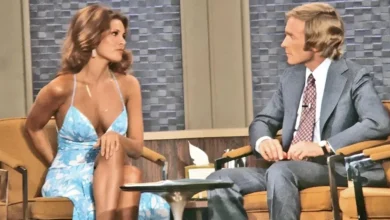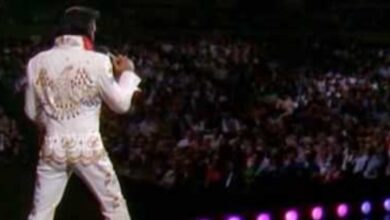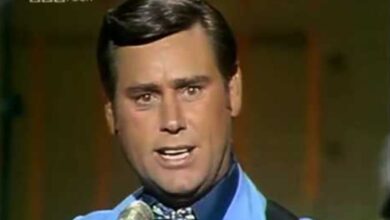Ricky Nelson’s ‘Poor Little Fool’ Becomes the First Billboard Hot 100 No. 1 and Defines a Generation in 1958
In the summer of 1958, Poor Little Fool by Ricky Nelson made history as the very first No. 1 hit on the newly established Billboard Hot 100 chart. Released on July 7, 1958, the song marked a turning point in rock and roll, capturing the youthful angst of the era with its smooth yet sorrowful melody. It was a song that spoke to the emotions of teenagers everywhere, blending rockabilly energy with a polished, almost crooner-like delivery. Beyond its immediate success, Poor Little Fool became an emblem of Nelson’s transition from a TV star to a legitimate rock and roll sensation.
Ricky Nelson’s rise to fame was unique in the world of music. Born in 1940 into Hollywood royalty—his parents, Ozzie and Harriet Nelson, were stars of the immensely popular TV show The Adventures of Ozzie and Harriet—he was introduced to the entertainment industry at an early age. While many assumed he would follow in his parents’ acting footsteps, music became his true calling. Unlike many teen idols manufactured by record labels, Nelson had a genuine passion for rock and roll. Inspired by Elvis Presley and Carl Perkins, he developed a distinct sound that blended rockabilly with a smooth pop sensibility. His ability to balance youthful rebellion with a clean-cut image made him one of the most beloved stars of the late 1950s.
The origins of Poor Little Fool trace back to songwriter Sharon Sheeley, a teenage girl with a talent for crafting heartbreak-infused lyrics. Inspired by her own experiences with love and rejection, she wrote the song as a slow, aching ballad. Sheeley, determined to break into the music industry, initially intended for a country singer like Don Everly to record it. However, fate intervened when she met Ricky Nelson backstage at a concert and convinced him to give the song a listen. Nelson saw potential in it but decided to rearrange it, transforming it from a slow lament into an up-tempo rock and roll ballad with a more radio-friendly appeal.
Nelson recorded Poor Little Fool at Master Recorders studio in Hollywood, with his signature backing band, which included the legendary James Burton on guitar. Burton’s crisp, bluesy licks gave the song a sense of sophistication, while the rolling drumbeat and upright bass added a rhythmic drive that kept it firmly within the rockabilly realm. Nelson’s vocal performance was understated yet deeply emotive, capturing the song’s essence of youthful heartbreak without over-dramatizing it. His smooth, almost effortless delivery made the song accessible to a broad audience, from rock and roll fans to those who preferred the more polished sounds of pop crooners like Pat Boone.
Upon its release, Poor Little Fool was an instant sensation. The song’s appeal was undeniable—it had the edge of rock and roll but retained the kind of melody and lyrical content that parents wouldn’t object to their teenagers playing on repeat. When Billboard introduced its now-iconic Hot 100 chart in August 1958, Poor Little Fool was the very first song to claim the No. 1 spot. This achievement cemented Ricky Nelson’s place in rock history and proved that he was more than just a teen heartthrob—he was a legitimate force in the music industry.
Beyond its chart success, Poor Little Fool played a pivotal role in bridging the gap between early rock and roll and the polished, radio-friendly pop that would dominate the early 1960s. Nelson, with his clean image and accessible sound, helped make rock and roll more palatable to mainstream audiences who were still skeptical of its rebellious undertones. While figures like Elvis Presley and Little Richard embodied the raw, untamed energy of rock, Nelson provided a softer, more approachable side to the genre.
The success of Poor Little Fool opened doors for Nelson in ways few could have predicted. His subsequent singles, including Lonesome Town and Travelin’ Man, continued to top the charts, allowing him to transition from a television star to a full-fledged music icon. He embarked on national tours, appeared on major variety shows, and became one of the best-selling artists of the late 1950s and early 1960s. His ability to evolve musically, incorporating country, rockabilly, and pop elements into his sound, kept him relevant even as musical trends shifted.
The influence of Poor Little Fool extended far beyond Nelson’s own career. The song set a precedent for the teenage heartbreak ballads that would become a staple of early rock and pop music. It paved the way for artists like Roy Orbison and The Everly Brothers, who would masterfully blend rock and roll with emotional storytelling. Furthermore, the song’s historic position as the first No. 1 on the Billboard Hot 100 ensured that it would always be remembered as a milestone in music history.
Over the years, Poor Little Fool has been covered by various artists, though none have quite matched the magic of Nelson’s original. Country legend Faron Young recorded a version that leaned into the song’s honky-tonk roots, while punk-infused rockabilly bands in the 1980s and ‘90s revived it as a nod to early rock’s golden era. Its melody and theme remain timeless, proving that heartbreak is a universal language that transcends generations.
At the time of Poor Little Fool’s release, Nelson was at the height of his fame, but he also faced the pressures of being one of the first true teenage idols. While his music career flourished, he struggled with the expectations placed upon him as a public figure. Nonetheless, he remained dedicated to his craft, continuing to record and perform until his untimely passing in 1985.
Decades later, Poor Little Fool remains one of Ricky Nelson’s most defining songs. It is frequently played on oldies stations and has been included in countless compilations of early rock and roll classics. Its legacy as the first-ever Billboard Hot 100 No. 1 ensures that it will always be remembered in the annals of music history.
More than just a hit song, Poor Little Fool represents a moment in time—a period when rock and roll was finding its identity and a generation of teenagers was discovering music that spoke to their emotions. It was a song that captured youthful heartbreak with sincerity, wrapped in a melody that still lingers in the minds of listeners today.
Even as music continues to evolve, Poor Little Fool stands as a testament to Ricky Nelson’s talent and his role in shaping the early days of rock and roll. Its legacy endures, not just as a historic chart-topper, but as a reminder of an era when rock was still young, filled with innocence, longing, and the endless possibilities of youth.



